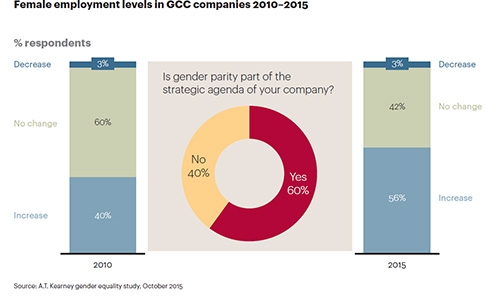GCC women educated but not gainfully employed: Report
Manama:Women are highly educated but not gainfully employed in the GCC region, according to a recent report by AT Kearney.
The region is unable to match the progress achieved in other parts of the world, despite significant progress over the years.
“The participation of women in the regional workforce remains one of the lowest globally, with the GCC falling behind other countries in capitalizing on the investment in education. In fact, the female labour participation ratio (FLPR) in two of the largest countries, Saudi Arabia and Oman, is below 30 per cent. Furthermore, in the best-positioned country—Qatar, with a 51pc FLPR—only half of the female population over 15 years of age is economically active.”
AT Kearney says that the ratio of women in senior positions varies across regions: from 35pc in the Americas, 29pc in Africa, 26pc in Asia, 21pc in Europe to a low 9pc in the GCC.
And this lag is pronounced in corporate board rooms, with women representation of board seats ranging from 0.01 pc in Saudi Arabia to a high of only 1.7pc in Kuwait. Globally, 17pc of board members are females.
The study also says that low figures in female employment happen despite the fact that women in the GCC are ambitious and value their career. They also do not believe that having a family is an impediment to work life.
“Eight out of 10 women surveyed attach a high importance to their career, and only 7pc are working exclusively for financial gains. Women in the GCC are also ambitious, with 62pc aspiring to a management role within the next seven years, and more than 50pc aiming at a senior or board-level position,” the report said.
Similarly, in starting new businesses, females are severely underrepresented. “Throughout the GCC, rates of business ownership by gender reflect this discrepancy In the UAE and Kuwait, there is a 5pc difference in business ownership between the male and female populations, with 2pc of women owning businesses compared to 7pc of men. In Bahrain and Saudi Arabia, the difference is 8pc, and in Qatar the difference is 11pc. However, the difference in start-up intentions across GCC countries is smaller. In Qatar, 32pc of the female population have start-up intentions compared to 40pc of the male population,” the report noted.
Entrepreneurs from the GCC region highlight access to capital and bureaucratic procedures and red tape as major impediments to starting business. For female entrepreneurs, the situation is worsened by the difficulty in having mentors.
“Finding mentors for women entrepreneurs within the GCC countries is challenging. In Bahrain, 57pc of male entrepreneurs report having access to a mentor, while only 38pc of female entrepreneurs reporting the same,’ it stated.
Many GCC policy makers are actively addressing the existing challenges. They have recently introduced a range of empowerment measures across the political, business, and educational arenas to level the playing field for women in the workforce.
These measures range from creating the necessary regulatory environment (such as the 60-day maternity leave introduced by the Qatar government) to strengthening the existence of role models in society, the report notes.
The study recommends that a concerted effort of all stakeholders - businesses, policy makers, academic institutions and families - is required to make gender parity a reality.
Related Posts

